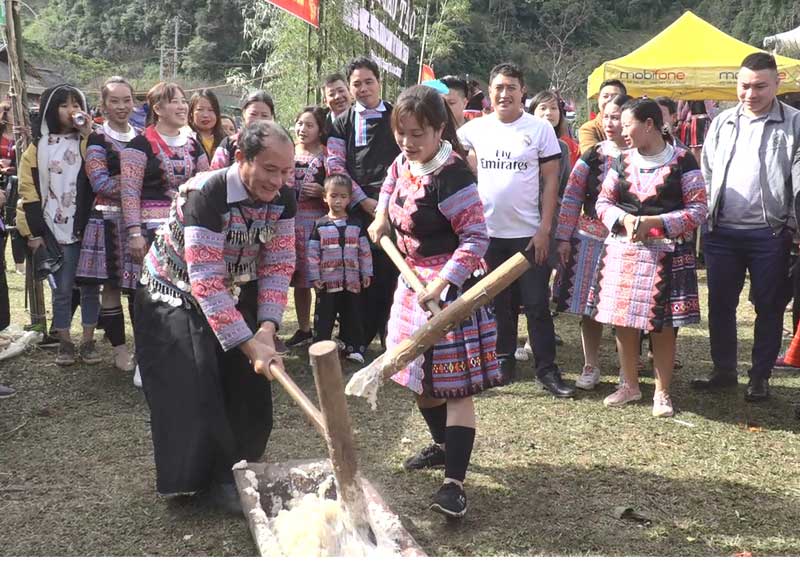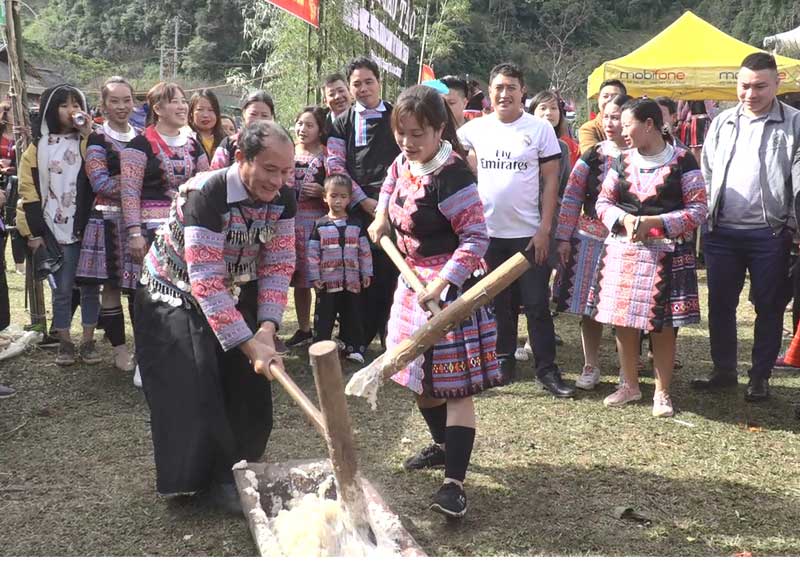
(HBO) - When Spring comes, Mong people’s villages in the communes of Hang Kia and Pa Co (Mai Chau district) are bustling with the sound of pounding "banh day” (sticky rice cake). Every Lunar New Year (Tet), local people gather together to make the soft and delicious cakes from steamed sticky rice.
For the Mong people, "banh day” is not only an offering to worship
ancestors on the occasions of the Lunar New Year or other festivals, but also a
dish for guests, especially those from faraway.
 The custom of making Banh
day of the Mong people in Hang Kia and Pa Co communes (Mai Chau district) is performed
in festivals.
The custom of making Banh
day of the Mong people in Hang Kia and Pa Co communes (Mai Chau district) is performed
in festivals.
"Banh day” of the Mong people is known as "Pe” or "Dua” in the Mong language.
For them, the cake has a sacred meaning like "banh chung” of the Kinh. "Banh
day” represents the sun, which is the origin of all things and species. On the
other hand, it also demonstrates the purity and faithfulness of the Mong
people.
The pounding of "banh
day” is a typical custom of the Mong, which reflects the strength and desire
for a happy life, thus requiring those who pound the cake to be strong.
Therefore, it is always performed by healthy and muscular young men.
The pounding must be done in rhythm until the rice becomes supple and smooth. The
more you pound, the softer the cake becomes and the longer it can keep.
The pounding of cake also shows solidarity and discipline in the community.
The women are responsible for preparing leaves for wrapping "banh day” cakes. Dong
or banana leaves must be cleaned and dried before they are used for wrapping. The
round cakes demonstrate the skillfulness of the women.
When travelling to Mong village in Tet
holidays, I always buy dozens of "banh
day” to give as gifts to my friends and relatives. To enjoy the full flavour of
"banh day”, the cake should be baked on charcoal or cut into small pieces and fried
until crispy crust, and be eaten with fish sauce or honey.
Along with traditional dishes
such as corn wine, hill pork and chicken, "banh day” is always an attractive
dish that everyone wants to taste in the most important festival of the Mong
people./.
With an increasingly vibrant and widespread emulation movement aimed at building cultured residential areas and cultured families, Yen Thuy District has been making steady progress toward improving both the material and spiritual well-being of its people, while fostering a civilized, prosperous, beautiful, and progressive community.
Once lacking recreational spaces and community facilities, Residential Group 2 in Quynh Lam Ward (Hoa Binh City) has recently received attention for the construction of a new, spacious, and fully equipped cultural house. The project followed the model of state support combined with public contributions in both labor and funding.
The "All people unite to build cultural life" movement, which has been effectively integrated with Kim Boi district’s socio-economic development goals, is fostering a lively spirit of emulation across local residential areas, hamlets, villages, public agencies, and enterprises. In addition, through the initiative, traditional cultural values are being preserved and promoted, while community solidarity and mutual support in poverty reduction and economic development are being strengthened.
A working delegation of the Hoa Binh provincial People’s Committee led by its Permanent Vice Chairman Nguyen Van Toan on June 11 inspected the progress of a project to build the Mo Muong Cultural Heritage Conservation Space linked to tourism services in Hop Phong commune, Cao Phong district.
Born and growing in the heroic land of Muong Dong, Dinh Thi Kieu Dung, a resident in Bo town of Kim Boi district, in her childhood was nurtured by the sweet lullabies of her grandmother and mother. These melodies deeply imprinted on her soul, becoming an inseparable part of her love for her ethnic group's culture. For over 20 years, this love for her hometown has driven Dung to research, collect, and pass down the cultural values of the Muong people to future generations.
In the final days of May, the Ethnic Art Troupe of Hoa Binh Province organized performances to serve the people in remote, mountainous, and particularly disadvantaged areas within the province. These were not just ordinary artistic shows, but they were the meaningful journeys aimed at spreading cultural values, enhancing the spiritual life of the people and contributing to the preservation of ethnic minority cultural identities.



 The custom of making Banh
day of the Mong people in Hang Kia and Pa Co communes (Mai Chau district) is performed
in festivals.
The custom of making Banh
day of the Mong people in Hang Kia and Pa Co communes (Mai Chau district) is performed
in festivals.